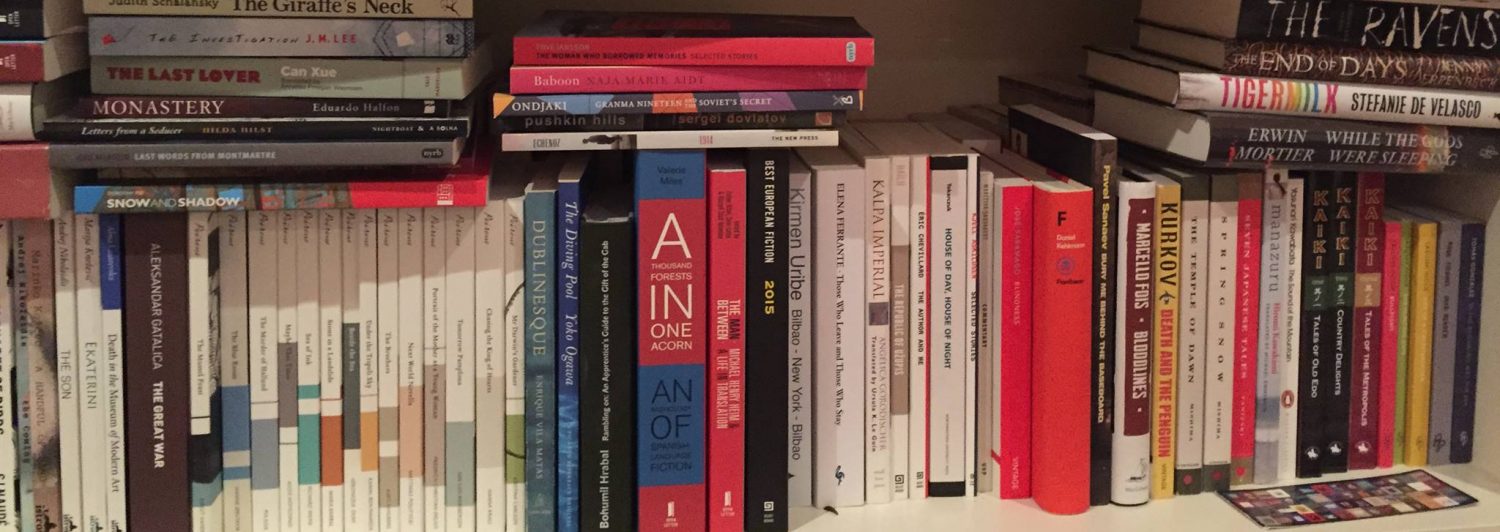
Whilst my book deliveries are severely delayed due to various COVID issues, my planned reading of the Goldsmiths Prize shortlist has also been delayed. Fortunately, I have a house full of books and numerous stacks of recently released unread titles. Time to have a look a recent release from Lolli Editions, Danish writer Tine Høeg’s ‘New Passengers’ (translated by Misha Hoekstra).
I’ve come across Misha Hoekstra’s work before, more specifically his translation of ‘Mirror, Shoulder, Signal’ by Dorthe Nors, a novel that was shortlisted for the Booker International Prize in 2017 (the winner was David Grossman’s ‘A Horse Walks Into A Bar’ – translated by Jessica Cohen). Nors’ novel introducing us to Sonja, a loner in her forties, single and really wanting to get her driver’s license. The mirror, shoulder, signal theme not simply her driving, it was used as a prompt for looking at the past (mirror), the present (shoulder), and the future (signal).
And there are some parallels with Dorthe Nors’s novel and Tine Høeg’s book, specifically the loneliness, the uncertainty of the future, the reflections on the past but a story deeply rooted in the present.
‘New Passengers’ is a prose verse novel, covering about five months in our unnamed protagonist’s life (August to December). On her first day of work, as a teacher, our protagonist meets a married man on the train and they begin an affair, here’s the opening page:
*
I’ve bought a monthly pass
I’ve been assigned a new name
a teacher’s name
comprised of four letters
from my first and last names
I’ve been given the code to the high school network
which is changed every six months according to the principle
summer16winter16summer17winter17
I’ve been briefed
on the systems
it’s by chance
we fall to talking on the train
my first day of teaching
I’m nervous and our legs
graze each other
when we sit down
you’re a graphic designer at a travel agency
you’re a commuter too
you’re ten years older than me
you’re married and father to a girl
It is only two pages later when we learn of the affair “the first time I see you naked”. Three pages and the narrative journey has been set, new job, an affair, and uncertainty about this move into adulthood.
There is not an entry for each day of the month (eg. September only has 27 entries) and some entries go for a number of pages, others a single word. It is through these sparse thoughts that we slowly learn of our protagonist’s unravelling, her feelings of inadequacy as a first year teacher, how she feels more connected to her students and their lives than to her fellow teachers, and how after any major event she crawls into her shell even further.
The fellow teachers are named by their four letter names “comprised of four letters/
from my first and last names” and the only people with full names are her students and the wife and daughter of her lover, Maria and Evy. An uneasy imagined relationship begins to form between her and her lover’s daughter Evy, mainly through dream sequences:
*
Evy lies on a red mattress
I kneel and look at her
she’s mumbling
then she reaches for me in her sleep
I don’t dare pick her up
there’s a mist around her skin
I pick her up anyway
she smells of you
then she bursts into flames
I try to put them out with my hands
my hands catch on fire
And a jealous relationship between her and Maria, there’s one page that simply says “Maria”.
It is through the use of space on the pages that I felt the isolation and our protagonists’ lack of a support network to share her emotions. Emptiness made concrete.
Her sexual encounters are in train bathrooms, in sheds, and occasionally at her home (until her lover is recognized near her home), and these are described matter-of-factly, “semen blood summer drizzle”, “I’ve never wanted/someone this way before”. Her relationship with her students brings back recent memories of herself at high school, a student sends a friend request on Facebook and it prompts recollection of a teacher she was in love with. And her lover is short in his communication a text message “you can’t write me/I’ll write you” adds to this sense of helplessness.
“New” passengers, there are the obvious references, our two lovers meet as passengers on the train and continue their daily commutes, there is also the passage to adulthood and us, as readers, are passengers watching our protagonist’s life unfold, we are helpless to offer any solace in her isolation.
A short novel, if you use word count for a definition rather than pages, there are 219 pages, but one that explores an uncertain move into adulthood. The blurb says it has “the immediacy of a text message”, where the deeper context is for you to decipher, whereas I saw these short illuminations and more of a snapshot into our protagonist’s uncertainty. Where shifts from larger events are immediately followed with periods of emptiness and confusion.
Another book that I received through my subscription to the Republic of Consciousness Prize, where a monthly subscription to the Prize is rewarded with a book from a small independent press (fewer than five staff) each month. And one that I wouldn’t be surprised to see on the International Booker Longlist for 2021, given the appearance of the prose poem novel Christoph Ransmayr’s ‘The Flying Mountain’ (translated by Simon Pare) in 2018 and through Misha Hoekstra’s previous listing with Dorthe Nors.
